
Annual Report 2023

Acknowledgement of Country
The Florey acknowledges the Traditional Owners of the land on which we work, the Wurundjeri people of the Kulin Nation. We pay our respects to their Elders past, present and emerging.
The Florey is committed to the aims, principles and actions of marra ngarrgoo, marra goori: The Victorian Aboriginal Health, Medical and Wellbeing Research Accord.
About The Florey

The Florey is the home of neuroscience in Australia and the largest brain research centre in the Southern Hemisphere, with teams of researchers dedicated to finding solutions for a range of brain and mental health conditions.
We’ve been on the forefront of this research for more than 50 years, improving understanding of the body’s most elusive organ.
Here at The Florey, the brightest scientific minds are sparking ideas and enabling us to meet urgent need with dedication, experience and excellence.
With innovative techniques and state-of-the-art technology, we collaborate to discover new ways to advance our understanding, develop new treatments and find cures.
Our vision and values
The Florey strives to advance brain research and improve the physical and mental health and wellbeing of people globally.
We are experts in brain research, curious about science, and inspired by the work and ideas of our community.
Our locations
The Florey is situated across two sites: Parkville, including the Kenneth Myer Building and Oak Street, and Heidelberg.
At Parkville we are positioned within the Melbourne Biomedical Precinct, one of the world’s leading biomedical hubs, delivering world-class research, healthcare and education.
At Heidelberg we maintain a close relationship with the Austin Hospital and are located on the Austin site.
Our proximity to two tertiary hospitals – the Austin and Royal Melbourne Hospital – allows direct access to clinical expertise and encourages partnerships that ultimately assist with the translation of research into clinical application.
Innovative facilities and research services
The Florey houses some of the world’s most advanced scientific equipment and services.
We are well placed to offer services and platforms for all stages of research – from discovery to clinical trials – with vital expertise in areas such as microscopy, bioresources and magnetic resonance imaging (MRI) through to Neuroscience Trials Australia and the Australian National CJD Registry.
Florey Annual Report 2023 3
A message from our Chair
I am delighted to share with you
The Florey’s 2023 Annual Report.
The Florey has always been a place of remarkable talent and life-changing scientific discoveries, and this year we are releasing our first Impact Report alongside this Annual Report.
2023 has been a year of consolidation and connection.
Consolidation by continuing to focus our research in key areas where The Florey can lead globally, strengthening our Executive team and developing our next generation of world-class research scientists.
Connection by reaching out to the community, collaborators, industry,
donors, politicians and key decision makers. Our rebrand, outreach and focus on commercialisation are key initiatives building on The Florey’s rich legacy of six decades of research. We are engaging in more strategic collaborative relationships with other worldclass institutes with the aim to accelerate the breadth and impact of our science.
I would like to pay tribute to all Florey researchers for their dedication, ingenuity and tenacity as they pursue real answers for the more than 5 million people in Australia who are affected by the conditions we study.
I also wish to thank Professor Trevor
Kilpatrick for his leadership and the Board for their ongoing support and commitment. I am honoured to chair The Florey as we continue to build on the legacy and dedication of our incredible scientists.
And to the donors and friends of The Florey – thank you for your steadfast support as The Florey continues its journey from strength to strength.

Mr Martin Adams Chair, The Florey
A message from our Director
It has been a year of significant achievement for The Florey.
Most importantly, we have seen the launch of our new scientific structure, spearheaded by four missions and four themes. The missions are directed to solving big, unresolved issues in medicine, in particular dementia, epilepsy, mental health and protecting and repairing the brain.
The themes are designed to advance fundamental research in ways that benefit the missions, with emphasis on neurotherapeutics, neuroimaging, the biology of synaptic connections between nerves, and finally, systems neuroscience,
focusing on understanding the body-brain interface.
The year has also witnessed a vast array of important scientific achievements, some of the most impressive are highlighted in the accompanying Impact Report. The common thread underpinning these discoveries is precision neuroscience, based on the fidelity of the work we undertake and the results we generate.
These are the foundations that drive our journey to become a scientific powerhouse on the world stage. That journey is predicated on the commitment and resolve of our people working collectively for community benefit.
Thank you to our dedicated Board Members
Mr Graeme A Billings
Mr Chris Blake
Professor Jane Gunn AO
Mr Peter Haig
Professor Mark Hargreaves AM
Mr Adam Horsburgh
Ms Kate Joel
Professor Christine Kilpatrick AO
My special thanks to the Board, COO Mr Andy Barlow, Clinical Director Graeme Jackson, Deputy Directors Andrew Lawrence and Clare Parish, as well as other members of the Executive.
I am proud to be part of our continuing journey and I look forward to ever broadening horizons for The Florey in 2024 and beyond.

Professor Trevor Kilpatrick
MBBS PhD
FRACP FAHMS Director, The Florey
Mr Ross Oakley OAM
Mr Stephen Spargo AM
4 Florey Annual Report 2023
1,016
62,758
233



260,000
2,171
Haydn Wright GM –Business Development The Florey’s 2023 at a glance publications Average number
citations: Our engagement Our staff Our productivity Our income appointments to The Florey’s Executive team items of media coverage
gifts received people new Florey-led competitive grants
members of staff Reaching Worth views
of
philanthropic
students
917
52
m $31.8 m New trademarked brand New website
35.4
501
+3 Clare Parish Deputy Director Andy Barlow Chief Operating Officer A total value of $5.9 m Florey Annual Report 2023 5
A year in review
January
Florey researchers identify a cause of brain inflammation during heart surgery, paving the way for preventative treatments for patients.

February
December
Florey researchers receive a combined $13.8 million from the NHMRC to support research to improve understanding and find treatments for conditions such as motor neurone disease, Alzheimer's disease and promoting brain health and repair. A new report shows data from the Australian Stroke Clinical Registry (AuSCR) is improving clinical outcomes for patients with stroke, with 2 leading hospitals achieving marked improvements.
We farewell the esteemed Professor Julie Bernhardt, a world leader in stroke research for more than 20 years, and pioneer of initiatives in stroke care and rehabilitation.
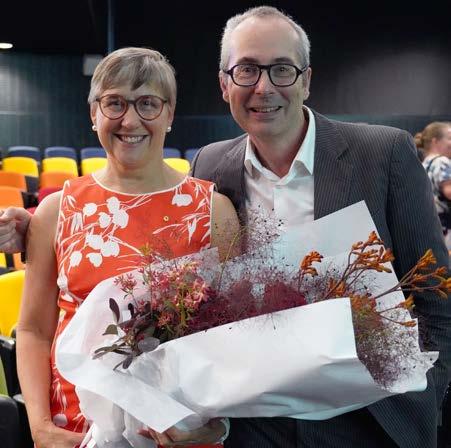
The Australian Epilepsy Project opens a hub in South Australia, giving more people access to advanced MRI scans, genetic analysis and cognitive testing.
March

In recognition of his legacy of discovery and leadership, founding Director of The Florey Professor Derek Denton is commemorated at a State Memorial Service. This is followed by a Festschrift at The Florey where staff and former colleagues celebrate his life and works.
Dr Ya Hui Hung is awarded $600,000 to lead a project advancing a potential new treatment for Niemann-Pick Disease Type C1, which causes childhood dementia.
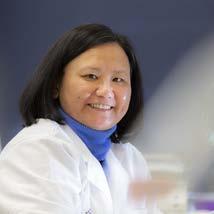

November
Professor Ashley Bush, Professor Colin Masters AO and Professor Christopher Rowe are included in the 2023 Highly Cited Researchers roster, ranking in the top 1% globally.
October
Florey scientists prove that sodium ascorbate – a pHbalanced formulation of vitamin C – is effective in treating sepsis, which accounts for 35–50% of all hospital deaths.
Nobel Laureate Professor Morten Meldal delivers the Allan and Maria Myers Lecture for 2023 at The Florey. Professor Meldal spoke about ‘click chemistry’ – the seminal work that was awarded the Nobel Prize for Chemistry in 2022.
6 Florey Annual Report 2023
April
Professor Kevin Barnham leads a Florey submission to the Parliamentary Inquiry into long COVID, highlighting the pressing need to better understand the neurological impacts of this condition.
May
The Young Stroke Service (YSS) is launched, creating a new model of care to support young people who have experienced stroke with their recovery and life goals.
The new Florey brand is launched, bringing a revitalised direction and a striking visual identity to reflect The Florey’s mission and pathway to impact.
The Florey’s new website also goes live.

June
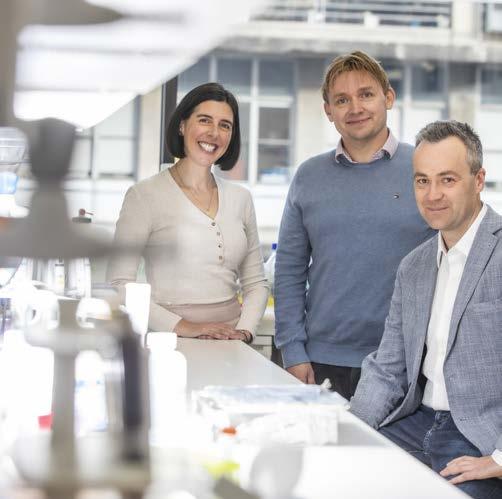
September
Florey researchers receive combined funding of $3.5m through FightMND, helping to accelerate development of potential treatments for motor neurone disease.
Open Day 2023 welcomes more than 170 potential students to learn more about studying at The Florey, with scientists and current students sharing their insights.
August
Dr Rebecca Nisbet, Associate Professor Daniel Scott and Professor Brad Turner win The Florey’s $100K Challenge in a collaborative effort to tackle a harmful protein that builds up in patients with certain brain diseases.
The Florey Awards ceremony celebrates the remarkable dedication and commitment of our staff and students, with over 130 staff presented with awards of recognition.
Florey researchers help identify the first genetic marker for increased multiple sclerosis severity, opening the door to preventing long-term disability in patients.
July
Professor Akhter Hossain leads an international team to a promising discovery that could improve peptide-based drug development for a range of disorders.

Florey Annual Report 2023 7
Florey research Missions and Themes
Research at The Florey is strategically aligned to Missions and Themes.
The Missions represent the health challenges we’re focused on tackling and the Themes demonstrate our in-depth expertise that applies to multiple areas of medical research.
Our Missions
Mental Health
Creating a better quality of life for people with mental health conditions
There is a clear and pressing need to accelerate research into mental health conditions to improve understanding, treatment options and care for those affected.
With this in mind, Florey researchers are building vital knowledge on how disruption of the biology of the brain is implicated in a variety of complex and common mental health conditions.
Key challenges
• 1 in 5 Australians live with a mental health condition
• 40m mental health prescriptions issued per year
Associate Professor Jess Nithianantharajah Research Co-lead
Professor Anthony Hannan Research Co-lead
Professor Ashley Bush Clinical Lead



Protect and Repair
Discovering new ways to protect and repair the brain
When the brain is affected by an injury, a disease or disorder, it can change a person’s life dramatically.
The Florey’s researchers in the Protect and Repair Mission are renowned experts in a diverse range of brain conditions. United by their commitment to further our understanding of neurodegenerative diseases and brain injuries, they aim to develop new approaches to treatments, including the innovative use of stem cells to repair the brain.
Key challenges
• 2,000+ Australians with MND
• An Australian will have a stroke every 19 mins
Professor Bradley Turner Research Lead
Professor Julie Bernhardt Clinical Co-lead
Professor Vincent Thijs Clinical Co-lead
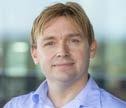


8 Florey Annual Report 2023
Epilepsy
Creating a better quality of life for people with epilepsy
Our teams are developing treatments that will provide more options and fundamentally improve the care of people with epilepsy.
We know that with the right treatment, most people with epilepsy are able to live a life without seizures.
Developing those treatments and implementing them for patients' benefit are our key goals.
Key challenges
• 260,000+ Australians live with epilepsy
• Estimated cost $12.3b in public healthcare
Professor Christopher Reid Research Lead
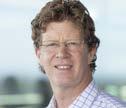
Dr David Vaughan Clinical Lead

Dementia
Making dementia preventable and treatable
Florey researchers are recognised as world leaders in dementia research – from defining the natural history of the disease and its pathology, to taking drugs from the laboratory to clinical trials.
Future research into dementia at The Florey will build upon this strong track record to identify new targets for treatments, improve patient diagnosis, trial new treatments and advance healthcare for dementia.
Key challenges
• 400,000 Australians live with dementia
• #2 cause of death in all Australians
Professor Scott Ayton Research Lead
Professor Christopher Rowe Clinical Lead
Professor Steve Collins Former Clinical Lead
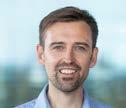
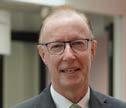

Our Themes
Neuroimaging
Developing cuttingedge technologies to image the brain and provide insights into brain structure and function
Research Lead:
Associate Professor Heath Pardoe

Systems Neuroscience
Deepening our knowledge on how the brain communicates with other vital organs in health and disease
Research Lead: Associate Professor Yugeesh Lankadeva

Neurotherapeutics
Investigating new drug targets and developing new treatments for brain conditions
Research Lead: Professor Ross Bathgate

Synaptic Biology
Investigating the function and plasticity of the brain, from single molecules to neural networks
Research Lead: Professor Lucy Palmer

Florey Annual Report 2023 9
Our Missions and Themes in action
The Missions and Themes structure facilitates deep collaboration among our researchers and a multidisciplinary approach to our science.
Epilepsy Mission
Systems Neuroscience Theme
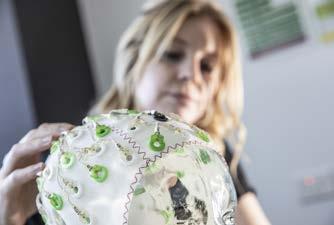

Epilepsy Mission
Neuroimaging Theme
Understanding what happens during a seizure
Florey researchers from the Epilepsy Mission and Systems Neuroscience Theme have teamed up to better understand how seizures impact cardiac function. New preclinical models of sudden unexpected death in epilepsy based on human genetics mean the team can measure how seizures change the function of the autonomic nervous system and identify potential therapies.
Protect and Repair Mission
Dementia Mission
Neurotherapeutics Theme

Protect and Repair Mission
Neuroimaging Theme
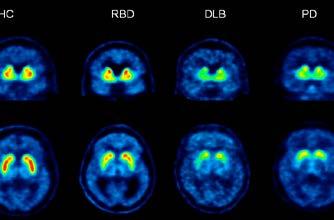
New imaging techniques to plan for brain surgery
Prof David Abbott’s team has recently implemented methods for improved functional MRI that reduces image ‘noise’. These techniques are used to identify the side of the brain that is primarily responsible for producing language. Knowing the dominant hemisphere for language is an important factor when planning brain surgery for people with severe epilepsy.
Targeting a culprit protein in neurodegeneration
Dr Rebecca Nisbett, A/Prof Daniel Scott and Prof Bradley Turner are investigating a protein, known as TDP-43, that accumulates in the central nervous system in multiple neurodegenerative diseases including motor neurone disease, frontotemporal dementia, Alzheimer’s disease and Parkinson’s disease. Removing TDP-43 shows promise for treating these diseases.
Detecting Parkinson’s disease decades before symptoms appear
Researchers at The Florey and Austin Health have shown it is possible to detect tell-tale signs of Parkinson’s disease 20–30 years before symptoms appear. Professor Kevin Barnham and colleagues describe how a biomarker called F-AV133 can be used with positron emission tomography (PET) scans to diagnose Parkinson’s disease and accurately track neurodegeneration. Their work opens the door to screening programs and preventative treatments long before irreversible damage occurs.
10 Florey Annual Report 2023
Image courtesy of Austin Health.
Dementia Mission
Protect and Repair Mission

Neurotherapeutics Theme
Mental Health Mission

Systems Neuroscience Theme
Dementia Mission

Synaptic Biology Theme
Dementia Mission

Synaptic Biology Theme
Mental Health Mission
Protect and Repair Mission
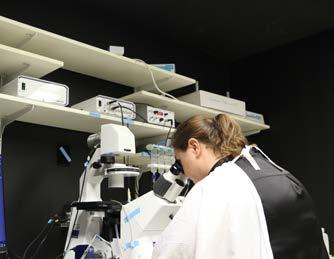
Unlocking how to use mRNA to target dementia
A Florey team has used mRNA to instruct cells in cell models to create an antibody Dr Recebba Nisbet developed to target tau. Tau is a toxic protein that clumps within the brain cells of dementia patients – and it’s a critical therapeutic target for Alzheimer’s disease and other dementias.
Developing a schizophrenia treatment with GPCRs
Using a proprietary new technology platform, a Florey team led by A/Prof Daniel Scott has developed to ability to facilitate more targeted drug discovery against a class of cell surface proteins known as G-protein-coupled receptors (GPCRs). This revolutionary technology will enable production of a new generation of medicines with improved efficacy and reduced side effects. The team is working on a much-needed new treatment for schizophrenia.
Validation of a novel zinc delivery drug for heart surgery-associated brain injury
A collaborative project between A/Prof Yugeesh Lankadeva and Prof Scott Ayton is tackling brain injury post-heart surgery. This injury prolongs hospital stays, increasing post-operative mortality and increases the future risk of dementia. The Systems Neuroscience Theme developed a world-first large animal model for heart surgery with continuous brain health monitoring, revealing neuroinflammation. The Dementia Mission discovered zinc’s benefits for brain vascular health and reducing inflammation and is now applying this knowledge to reduce the post-heart surgery injury.
How and where memories are formed in the brain
Prof Lucy Palmer is leading research into how brain function is altered during learning and memory formation. Using advanced techniques, her laboratory measures how individual neurons modify their activity over time. This research will help in our understanding of how we form memories and shed light on what goes wrong when our memory fails.
Finding a treatment for neurodevelopmental disorders
Dr Sarah Gordon is studying how defects in the molecular machinery of cells leads to neurodevelopmental disorders such as intellectual disability, autism and epilepsy. Some families have searched for an answer for decades, until Dr Gordon's work led to a diagnosis for their children. Now her team is back on the hunt, searching for a treatment.
Florey Annual Report 2023 11
The NHMRC researchers revolutionising health
The National Health and Medical Research Council (NHMRC) is the Australian Government’s research funder, attracting more than 4,000 applications from researchers each year.
In a highly competitive process, our researchers must pitch creative, innovative concepts that will have great impact on relevant health challenges. We celebrate the variety of grant-winning researchers from 2023 investigating vital questions to advance brain research.




Understanding the role of the cortex in learning, memory and brain cancer
Despite decades of research, there is a lot to learn about the brain’s cortex, including its contribution to important functions such as learning and memory.
Prof Lucy Palmer’s team uses advanced calcium imaging and electrophysiology to
Enabling personalised medication regimens for people with Alzheimer’s
Patients with Alzheimer’s disease tend to have more comorbidities and are often prescribed 5–10 more medicines than other people. Ensuring the safe use of medications is critically important.
Dr Liang Jin's research team uses
Locating metabolic parts of the brain most affected by adverse childhood experiences
Adverse childhood experiences (ACE) contribute to many mental and physical disorders, including depression, anxiety, diabetes and cancer. ACE affects the brain’s metabolism and is transmissible across generations.
Reducing
the risk of brain and kidney injury arising from
sepsis
and heart surgery
Injury to the brain and kidneys are lifethreatening complications that endanger intensive care patients. They occur in millions of patients worldwide diagnosed with sepsis or undergoing cardiopulmonary bypass surgery.
capture the activity of neurons in the cortex, shedding light on:
• the role of cortical neurons in learnt behaviour and memory
• how cortical neurons are fundamentally altered by brain cancer
• the role of the cortex and cortical neurons in brain function and dysfunction.
pharmacometrics modelling, blood sample collections, and patients’ comprehensive medical histories to establish the relationship between medication use and severity of a patient’s Alzheimer’s disease. This research will inform more personalised medication use that is safer for people living with the disease.
Prof Anthony Hannan’s team will investigate how genes and the environment affect these brain conditions, by studying how ACE affects lipid metabolism and related aspects of brain development. Identifying long-term effects of ACE should inform better therapeutic approaches.
A/Prof Yugeesh Lankadeva’s research program aims to minimise the risk of sepsis- and heart surgery-induced brain and kidney injuries, by testing new Floreypatented drug formulations: intravenous sodium ascorbate for sepsis, and zinchistidine for heart surgery.
Professor Anthony Hannan
Professor Lucy Palmer
Associate Professor Yugeesh Lankadeva
12 Florey Annual Report 2023
Dr Liang Jin

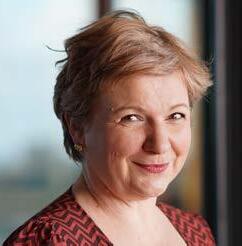

Bradley Turner

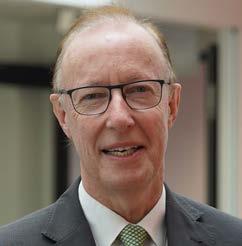
Restoring control of flexible decisionmaking in schizophrenia
The ability to adapt our behaviour when situations change relies on flexible decision-making and learning. This ability is impaired in mental health conditions like schizophrenia, and we lack effective treatments.
A/Prof Jess Nithianantharajah’s team works to understand the neural causes of
Developing gene therapies to treat different neurological conditions
Many neurological conditions are caused by genetic differences in our DNA affecting gene expression, resulting in altered activity and amount of protein molecules. These changes can then affect the function of cells, growth and metabolism.
A/Prof Snezana Maljevic’s team is looking to advance antisense oligonucleotide (ASO)
Developing a world-first trial to prevent cell death in ALS
ALS (amyotrophic lateral sclerosis) is a motor neurone disease that leads to muscle weakness or paralysis. Prof Bradley Turner’s team investigates cell death in ALS –including a newly discovered process, ferroptosis.
Repairing nervous system damage using stem cell technology
With a rapidly ageing population, neurological conditions in Australia are expected to rise three-fold in the next 20 years, creating a pressing need for new therapies.
Prof Clare Parish’s team uses stem cell biology and engineered matrices to model complex diseases in novel ways and to
A new era in treating and diagnosing Alzheimer’s Disease
Beta-amyloid imaging (Aβ PET) is a trusted method used to detect and monitor Alzheimer’s disease. It visualises the brain’s beta-amyloid plaques, which are found in the disease, and has led to new treatments, such as lecanemab.
But the recent US approval of lecanemab raises questions on patient selection,
disrupted decision-making. Specifically, how an imbalance in excitatory/inhibitory cell activity in the brain's prefrontal cortex may be key.
The team will use advanced imaging tools to capture prefrontal neural activity at single cell resolution. They aim to identify neurobehavioural markers to accelerate development of therapeutics for schizophrenia.
technology, which can accurately and efficiently target the mRNA that carries information from affected genes to alter the expression of target proteins.
A/Prof Maljevic’s project will facilitate assessments of the safety and efficacy of ASO and other similar gene-targeting approaches, to shorten the period needed to get these therapies into the clinic.
Ferroptosis is an abnormality in cell metabolism that drives various neurodegenerative diseases. Preventing it requires a multi-drug approach. With his team, Prof Turner will conduct a world-first trial to test new and potent drugs that can inhibit ferroptosis in ALS, in collaboration with both academic and industry collaborators.
develop improved approaches to repair the injured brain through neural cell transplantation.
Prof Parish has pioneered using stem cell technologies for benefit in Parkinson’s disease. This project will also perform preclinical testing of a human stem cell product in preparation for a Phase I clinical trial in stroke.
dosages, and safety. Prof Christopher Rowe’s project will further develop the Australian Dementia Network Registry to facilitate the use of PET tracers and cerebrospinal fluid and blood-based biomarkers for safer, more personalised and cost-effective use of these emerging treatments.
Professor
Professor Christopher Rowe
Professor Clare Parish
Associate Professor Jess Nithianantharajah
Florey Annual Report 2023 13
Associate Professor Snezana Maljevic
Shining bright

The Florey Awards 2023 celebrated the remarkable dedication and commitment of staff and students, with over 130 staff were presented with awards of recognition.
Five new award categories were presented by Florey Board Chair Martin Adams to capture the breadth and diversity of Florey research across all teams and career stages.
“In the realm of research, we are no strangers to the relentless pursuit of knowledge and innovation. It is this spirit that unites us, the driving force behind our collective efforts to make a meaningful impact on the lives of countless individuals,” he said.
Speaking at the awards, Professor Trevor Kilpatrick said, “As the Director of The Florey, I am deeply proud of our collective accomplishments during my tenure. The discoveries, innovations and breakthroughs made within these walls have without doubt changed lives, and it’s thanks to you."
2023 Florey Award Winners
Lend a Hand Award
The winner of this award is a staff member that has been a tremendous support for their colleagues during the year. Often flying under the radar, this person plays a vital role in progressing projects or tasks.
Winner: Celeste Mawal
Exceptional Talent Award
The winner of this award is someone who goes above and beyond in their role at The Florey in either a research or professional services capacity.
Winner: Professor Clare Parish
Pathway to Impact Award
The winner of this prize is someone who has demonstrated a commitment to improving the lives of people both in Australia and globally through their research.
Winner: Professor Akhter Hossain
Dynamic Collaborator Award
The winner of this prize is someone who has demonstrated a commitment to improving the lives of people both in Australia and globally through their research.
Winner: Associate Professor Yugeesh Lankadeva
Team of the Year Award
The winner of this award is either an established group or business unit, that has demonstrated great teamwork, team spirit and has, together, delivered great outcomes for The Florey.
Winner: Stem Cells and Neural Development Group
Length of service awards
10-year milestone: Julie Andrew, Scott Ayton, Kevin Barnham, Cetina Bertelle, Ian Birchall, Lindsea Booth, Karen Borschmann, Emma Burrows, Christopher Bye, Danielle Caruso, Susan Cox, Brittany Cuic, Steven Fleming, Shannon Gaspari, Adele Gibbs, Elissa Hardman, Xin Huang, Ross Humphreys, Connie Jacobs, Laura Jacobson, Irina Kouchnareva, Xiang Liu, Lucy Mackintosh, Stuart McDougall, Carol Milligan, Steven Oliphant, Carlos Opazo Martinez, Lucy Palmer, Donna Parker, Thibault Patrick Renoir, Joanne Robertson, Mathew Salzone, Amelia Sedjahtera, Fazel Shabanpoor, Kathy Skoff, Robert Smith, Adam Southon, Christiane Stehmann, Christoper Tailby, Fran Tait, Elsa Tsui, Emilio Werden
14 Florey Annual Report 2023
Award winner Prof Akhter Hossain thanks colleagues
15-year milestone: Paul Adlard, Maria Bastias, Krista Brown, Ashley Bush, Lynley Cordeiro, Daniel Drieberg, Fiona Ellery, Travis Featherby, David Finkelstein, Christopher Fowler, Andrea Gogos, Mark Greenough, Akhter Hossain, Ya Hui Hung, Vijaya Kenche, Taryn Knight, Gawain McColl, Clare Parish, Leah Payne, Anita Pejic, Kelly Pertile, Sandra Petrolo, Christopher Reid, Kay Richards, Rebecca Rumble, Daniel Scott, Gena Shoykhet, Margit Simondson, Anna Sellens, Lachlan Thompson, Brett Trounson, Bradley Turner, Thomas Vale
20-year milestone: Alison Petrou, Andrew Lawrence, Anthony Hannan, Anthony Dornom, Carmel Jacobson, Catriona McLean, David Abbott, Dominque Cadilhac, Doris Tomas, Fairlie Hinton, Gregory Thomas, Julie Bernhardt, Kenny Jao, Michele Binder, Rian Mackenzie, Sally Hood, Sharon Layfield, Steven Petrou, Vera Phipps
25-year milestone: Alistair Kittson, Graeme Jackson, Melinda Goga, Ross Bathgate, Simon Miller
30-year milestone: Christine Johnston, Clive May, Craig Thomson, Geoff Pavey, Li Chun Quang, Qiao-Xin Li, Tania Ferraro
35-year milestone: Brian Dean
40-year milestone: Mick Petrovski
45-year milestone: Brett Purcell

Donor awards
L–R, Prof Bradley Turner, Mr John Milne, Dr Taide Wang
Anonymous Philanthropic Postgraduate and Postdoctoral Travel Awards
PhD winners: Katherine Lewis, Chiara Pavan and James Spyrou
Postdoc winners: Francesca Alves, Ming Soh, Leigh Walker
Caitlin’s Fund Postgraduate and Postdoctoral Travel Awards
PhD winner: Suyi Ooi Postdoc winner: Lauren Bleakley
Harold Mitchell Foundation Postgraduate and Postdoctoral Travel Awards
PhD winners: Xavier Maddern and Chaseley McKenzie Postdoc winner: Christina Mo
John Milne Prize for Neuroscience Winner: Taide Wang

Dr Kwaku Dad Abu-Bonsrah, Jennifer Jin, Andrew Quattrochi, Dr
Moriarty, Prof Clare Parish, Prof Trevor Kilpatrick
Wally and Jean Jackson Postgraduate and Postdoctoral Prizes
PhD winner: Vicky He Postdoc winner: Cherry Mao
John Collier Postdoctoral Travel Scholarship
Winner: Niamh Moriarty
Florey travel awards
Alan Rembach Postdoctoral Travel Award
Winner: Sarrabeth Stone
SOFI Travel Award & Ayse Berke and Liana Colvill Postgraduate Travel Award
Winners: Lizzie Kleeman and Anton Task-Marino
Florey Postgraduate Travel Award
Winner: Ann-Sofie Bjerre, Andy Zhang and Chau Tran
Postdoctoral Best Paper Award
Winners: Niamh Moriarty and Francesca Alves
The Craig Drummond Award
Winner: Natasha Krishnadas
Scientifix | FPA Postdoctoral Award
Winner: Eric Pierre
Florey Purchasing Student Travel Prize
Winner: Heidi McAlpine
Neuropix
The Florey’s annual microscopy photography competition, where cutting-edge science and artistic brilliance collide to bring the unseen to life, saw winners in the categories of Scientific Award and People’s Choice.
Winners: Shivani Vaidya and Chau Tran
L–R,
Niamh
Florey Annual Report 2023 15

A place where brilliant minds gather
With a relentless pursuit for cutting-edge research and innovation, The Florey draws leading scientific talent from across the world to share their expertise and spark novel ideas.
The Florey is a beacon of excellence in brain research, attracting some of the brightest minds in science and chemistry from around the globe.
One such luminary is Nobel laureate, Professor Morten Meldal, renowned for his groundbreaking work in the field of chemical synthesis. Professor Meldal visited The Florey in October to deliver the Allan and Maria Myers Lecture for 2023.
During his enlightening lecture, Professor Meldal spoke about ‘click chemistry’ — the seminal work that was awarded the Nobel Prize for Chemistry in 2022 and the pursuit of excellence that earned him the Nobel Prize.
Professor Meldal’s research has focused on developing novel click reactions and expanding the scope of click chemistry applications, leading to advances in drug discovery, bioconjugation and materials science.
As an interdisciplinary Institute that fosters a collaborative environment where ideas flow freely and expertise from diverse fields converge, Professor Meldal’s visit not only inspired new waves of thought but also reinforced The Florey’s commitment to pushing the boundaries of scientific exploration.
This synergistic approach not only accelerates scientific breakthroughs but also cultivates a sense of community among researchers, nurturing creativity and collaboration, both in Melbourne and across the world.
Alongside Professor Meldal, it was also a privilege to welcome his wife, Dr Phaedria Marie St. Hilaire, an esteemed business leader, chemist and advocate for diversity and inclusion, to share her knowledge while at The Florey. During her visit, Dr St. Hilaire imparted valuable insights on embracing intersectional diversity through inclusive leadership.
The visit of these two esteemed leaders to The Florey underscored the Institute’s international reputation, a fertile ground for scientists alike to push the boundaries of knowledge and discovery — and a magnet for brilliant minds to be part of transformative research endeavours and scientific ingenuity.
 Prof Morten Meldal, Dr Phaedria Marie St. Hilaire
Professor Morten Meldal addresses a full house at The Florey
Prof Morten Meldal, Dr Phaedria Marie St. Hilaire
Professor Morten Meldal addresses a full house at The Florey
16 Florey Annual Report 2023
Tomorrow’s leaders
Celebrating the PhD graduates of 2023
Students, or graduate researchers as they are alternatively known, are an integral part of The Florey’s research. We currently host more than 200 students from across Australia and globally, all with an amazing enthusiasm for neuroscience.
Our graduate researchers not only provide a wealth of diversity but also talent and bright ideas, which elevates the overall Florey experience. Under the guidance of our exceptional researchers, our students contribute to a vibrant and productive environment that propels the field of neuroscience forward, every day.
While the pandemic may seem far behind, the 2023 graduates faced COVID-related obstacles that severely impacted their projects and derailed timelines. Yet, with resilience and determination, they adapted to the circumstances and produced highquality research.
Negar Asadian: Negar started her PhD journey in 2019 at The Florey under the supervision of Professor Trevor Kilpatrick and Michele Binder. Her research focused on potential treatments of multiple sclerosis.
Negar’s work unveiled the significant role of the protein GAS6 in promoting myelin repair through the Tyro3 receptor.

“COVID initially impacted social interactions among students and changed the lab atmosphere, however, we managed to overcome this period by supporting each other through Zoom events. I recall eagerly anticipating the weekly game nights that SOFI hosted.”
Supporting the next generation of brilliant scientists
At The Florey, we consider our students early-career researchers. Our Student of the Florey Institute (SOFI) association hosts a variety of events every year to connect students with each other and offer professional development, including mentoring.
The dedicated Student Support team help all students on every aspect of their candidature, whether it be practical or personal. They take great
Today, Negar is a successful postdoctoral fellow at Stanford University School of Medicine in the US, studying the role of the cerebellum in learning and memory.
Lisa Williams: Lisa conducted her doctoral studies in the Drug Discovery Innovation group. Her research focused on enabling the discovery of antibodies for G protein-coupled receptors, an important class of drug targets in the body.

“SOFI and the student community at The Florey was so important to me during my PhD and I made life-long friends and now have a network of amazing scientists all over the world.”
Lisa’s work during her PhD contributed to the start-up company LASEREDD Therapeutics, which she continues to work with today. The aim is to discover and develop therapeutics for difficult to 'handle' receptors and ion channels.
Rei Masuda: Rei was a PhD student in the Neural Networks Group, supervised by Professor Lucy Palmer. His research focused on the influence of the thalamus and the superficial cortex on goal-directed behaviours.

“I had a great experience, largely thanks to the people at The Florey. I felt very fortunate to have constant support from my peers and supervisor throughout my studies. An ongoing challenge that I faced during my PhD was finding an efficient workflow that suited me. I overcame this towards the end of my PhD by doing regular check-ins with my peers. Lastly, although I may have taken it for granted at the time, The Florey also provided us with great facilities and benefits that made my time there a lot more pleasant.”
Today, Rei works as a data scientist in the education sector.
pride in getting to know every student and have a deep understanding of the student journey.
“Our graduate researchers really are the lifeblood of The Florey. It is amazing to see these bright minds grow and thrive through the challenges that come with undertaking groundbreaking innovative research. We are immensely proud of all our 2023 graduates. We wish them all the best in their future careers and hope to see many of them continuing their research here at The Florey, and around the world.”
– Associate Professor Jess Nithianantharajah
Florey Annual Report 2023 17
Fundraising and philanthropy at The Florey
The Florey is founded on a history of generous individuals, community groups, and trusts and foundations that are passionate about supporting groundbreaking medical research which will have an impact for generations to come. It is very exciting to see so many first-time donors in 2023 and the substantial increase in bequests over the previous year.
As the new Fundraising Committee Chair, I’d like to thank everyone who this year hosted an event on our behalf, undertook a fundraiser to benefit us, and either donated or put The Florey in their Will. Whether you are a first-time donor, a

It has been my pleasure to serve as the chair of the Fundraising
regular giver or a family who has been giving across generations –every donation, no matter the size, makes a difference. Without you, our researchers at The Florey would not have the same opportunities to understand how the brain works, develop new diagnostic tools, new treatments and new ways to prevent neurological conditions. We hope that you enjoy seeing the scientific achievements that your support has made possible and we welcome the opportunity to meet with our donors any time to share our latest discoveries.
I must make special mention to all the members of The Florey Society
Committee for the past eight years. The Florey is undoubtedly one of the most influential brain research institutes in the world and I have thoroughly enjoyed sharing the outcomes from our remarkably talented researchers with the donor community.
The Florey is privileged to have so many donors that continue to support groundbreaking research that is
Fundraising and philanthropy in numbers

who have confirmed to us that they have put The Florey in their Will. Thank you for your generosity, we are extremely grateful to all of you and know that many of you are also giving in your lifetime.
I’d also like to pay tribute to Ross Oakley who has stepped down from his role as Fundraising Committee Chair after eight years of dedicated service. We thank him for his time and great contribution to The Florey.
Thank you again to everyone for your generosity in 2023.
– Ms Kate Joel, Chair of Florey Fundraising Subcommittee
having a direct impact on improving the lives of those in need. The Fundraising Committee welcomed last year the new Chair Kate Joel and I’m sure The Florey’s fundraising efforts will continue to provide ongoing and growing support for our world-class research teams.
– Mr Ross Oakley, Chair of Florey Fundraising Subcommittee 2016-2023
2,171 $2,728,000 1,200 20+ 25+ $5.9 m
total philanthropic gifts received received from bequests research projects trusts and foundations individual donors A total value of supported by philanthropy supported The Florey
445 were first-time donors Median gift of $100
18 Florey Annual Report 2023
Our supporters
Our donors provide essential funding to allow our researchers to develop their ideas and innovations.
Generous support drives our ability to make discoveries to better diagnose, treat and prevent the diseases of the brain and mind that we study.
We are grateful for the generous support we receive from individuals, corporations, trusts and foundations and community groups.
Florey Governors
Andrew Abercrombie
Martin Adams
James Angus
Etienne Baulieu
Samuel Berkovic
Graeme Billings
Christopher Blake
Neal Blewett
Graeme Bowker
Di Bresciani
Alec Broers
Malcolm Broomhead
John Brumby
Tom Buchan
Edward Byrne
Lyndsey Cattermole
Jean-Pierre Changeux
Trevor Clark
Peter Clemenger
David Copolov
Philip Cornish
Charles Curwen
Andrew Cuthbertson
Tim Daly
Stephen Davis
Jerry de la Harpe
David de Rothschild
David de Souza
Peter Doherty
Carl Dowd
“As
Wendy Dowd
Suzanne Downes
Craig Drummond
George Fink
Alan Finkel
John Finlay-Jones
Roger Flynn
Tamie Fraser
Peter Fuller
John Funder
Rob Gerrand
Kelvin Glare
Charles Goode
Susan Greenfield
Jane Gunn
Sandra Hacker
Peter Haig
Mark Hargreaves
Pamela Hauser
Caroline Hogg
Adam Horsburgh
Andrea Hull
Margaret Jackson
Bevyn Jarrott
Kate Joel
Mark Jones
Barry Jones
Peter Jopling
Shitij Kapur
Graeme Kelly
Bruce Kemp
Christine Kilpatrick
Jennifer Labourne
a science student at the University of Melbourne, I used to walk by The Florey and dream of becoming a researcher. Now I work here! I am so grateful to the donors who make our work possible.“
- PhD student
Frank Larkins
Richard Larkins
John Lill
Paul Little
Bernard Lochtenberg
Lina Marrocco
Jim McCluskey
Elspeth McLachlan
George McMaster
Frederick Mendelsohn
Naomi Milgrom
Harold Mitchell (dec)
Brendan Murphy
Louise Myer
Martyn Myer
Allan Myers
Maria Myers
Mark Nelson
Hugh Niall
Ross Oakley
Simon Parker Bowles
Primrose Potter
John Poynter
Ian Renard
Geoffrey Ripper
Eda Ritchie
John Rose
Thomas Schneider
David Scott
Richard Smallwood
Stephen Spargo
Andrew Stripp
Boris Struk
Geoffrey Tregear
Robert Trenberth
Gad Trevaks
Anne Ward
Andrew Wardlaw
Elizabeth Wardlaw
Brian Watson
Ingrid Winship
Marelyn WintourCoghlan
Meredith Woods
Michael Wooldridge
John Wylie
Harrison Young
Founding benefactors
Kenneth Myer
Ian Potter
Florey Future Fund donors
Principal Benefactors (above $3 million)
Carl and Wendy Dowd
Estate of Mary Lugton
Harold Mitchell (dec)
Fellow
($250,000 – $499,999)
Primrose Potter
Associate
($100,000 – $249,999)
Lyndsey Cattermole
The Drummond Foundation
GSA Industries Pty Ltd
Omnico Operations
Estate of Marjorie
Talan and Akos Talan
The A N and B O
Williams Foundation
Brains Trust members
Christine Aarons
Cameron Afrasiabi
Charles Allen
Chris Baohm
John Bennetts
Duncan Bentley
Graeme and Letitia Billings
Angelo Bladeni
John and Meg Bowen
Colin Carter
Lyndsey Cattermole
Peter and Jan Clark
Anthony Conabere
Barbara Darvall
Carl and Wendy Dowd
Tom Garlick
Nigel Gaunt
Gaye and John
Gaylard
Wayne and Suzanne Gill
Peter Gillooly
Ai-Gul and Andrew
Guild
Andrew Guy
Mary Harper
Michael Hayja
Linda Herd
North Projects
Elouise Holmes
George Janko
Kate and Warren Joel
Andrew Keen
Hugh Kelso
David Laidlaw
Peter Lumley
Frances Millane
Lana Moran
Dennis and Fairlie
Nassau
Peter Nixon
Christine Oakley
Ross Oakley
Pharmacy Alliance
Teresa Poon
Tony and Helen Pyman
Michelle Quigley
Sharon Roberts
Caroline Robertson
Greg Roebuck
Nicola Rollerson (APS Foundation)
Rotary Club of Williamstown
Graeme Samuel
Florey Annual Report 2023 19
“Your
researchers and staff are so committed and enthusiastic. When The Florey comes up with a success, it makes me feel proud to be part of the process.“
- Anonymous donor
Bob Santamaria
Caroline Shaw
Mike Sheahan
Stephen Spargo
Gary and Glenise
Travaglia
Harrison Young
Florey Foundation donors
Deirdre Collier
Caitlin’s Fund
Estate of Dorothy
Jean Jackson
Naomi Milgrom
John Milne
Allan and Maria Myers
Donors with lifetime giving of over $1 million
Joanna Baevski
The Baker Foundation
Bethlehem Griffiths Research Foundation
Caledonia
Cornish Group of Companies
Derek Denton
Endowment Fund
DHB Foundation managed by Equity Trustees
Carl and Wendy Dowd
Equity Trustees Limited
Estate of Charlotte
Mary Hermine
Trunshnig
Estate of Kenneth Baillieu Myer
Estate of Marjorie Talan and Akos Talan
Estate of Mary Lugton
FightMND
Harold Mitchell Foundation
The Heart Foundation
Hearts and Minds Investments Limited
Helen Macpherson
Smith Trust
Howard Florey Biomedical Foundation (US)
Howard Florey Medical Research Foundation
The Ian Potter Foundation
The Jack Brockhoff Foundation
The Michael J Fox Foundation
Naomi Milgrom
The Minderoo Foundation
MND Research Institute of Australia
Harold Mitchell (dec)
Martyn Myer
The Myer Foundation
Allan and Maria Myers
National Institutes of Health (NIH) USA
One in Five
The Percy Baxter Charitable Trust
Perpetual Trustees
Australia Ltd
Zeljko Ranogajec
The Rebecca L Cooper
Medical Research Foundation Ltd
Stafford Fox Medical Research Foundation
The Sidney Myer Fund
Sylvia and Charles Viertel Charitable Foundation
James Wiley (dec)
The William Buckland Foundation
The Yulgilbar Foundation
Our donors in 2023
Donors with gifts of $10,000 to $999,999
Peter Armstrong
A-T Children’s Project (US)
Australian Dementia Network (ADNet)
Australian Rotary Health
John and Lorraine
Bates
Berwick Opportunity
Shop Incorporated
Brain Australia
The Brain Cancer Centre
Fight Parkinson’s FightMND
Filadelfia Epilepsy
Hospital (Denmark)
Roslyn Glow
Hearts and Minds
Investments Limited
The Hunter’s Fundraising Group
Kate and Warren Joel
Lana Moran
MND Research Institute of Australia
Old Xaverians
One Less Broken Heart, Inc. (US)
Judy Overbeek
Richard and Juneth
Wall
Donors with gifts of $1,000 to $9,999
Andrew Abercrombie
James Allen
Anonymous
Pauline Atkins
Nicholas Barton
Sandra Benjamin
John Bennetts
Jonathan Benson
Matthew Benson
Angelo Bladeni
Cornelis Boekel
Mary Bram
Margaret Bullen
Valerie Bunter
Candlebark School
Grace Cavanagh
Elaine Chang
Diana Cherry
CJD Support Group
Network
Faye Clarke
Patricia Clennett
Andrew Close
Dorothy Collin
Kevin Cosgrave
Greg Costello
Geoffrey Cottrell
Judy Cowan
Keith Curry
Barbara Darvall
Eril Deighton
John Dixon
Susan Duncan
Andrew Erikson
David Feldman
Janine Ferguson
Sue Fletcher
Valmae Freilich
David Geer
Angela Gibson
Peter Gilbertson
Wayne Gill
Peter Gillooly
Shirley Gionfriddo
Clare Gleeson
Go Salary
Goldie Nominees
Pty Ltd
Romi Goldschlager
Susan Grant
Peter Gray
Lesley Griffin
Sandra Hacker
Frank Hancock
John Harrison
Robert Henwood
Annelie Holden
Bill Holdsworth
Illabarook Pty Ltd
Inner Wheel Club of Bairnsdale
Inner Wheel Club of Pakenham
Susan Iovenitti
Rosemary Jenkins
Kathleen Johnston
Ian Kennedy
Val Kennedy
Wesley Kilham
So Yeon Kim
Peggy Knight
John Leaver
Bonnie Lee
Brian Little
Peter Lumley
Christine MacGill
Elaine Mann
June Marks
Heather Mason
Allistan Mayor
John McKenzie
Muriel McLaren
Victoria McNeilly
Elizabeth Mildwater
Bruce Moran
Dennis Nassau
Kui Meng Ng
Helen Ng
Peter Nixon
Heather Nixon-Smith
Valerie Osbourne
Pakenham
Opportunity Shop Inc
Patsy Patten
Patricia Peck
Elizabeth Pender
Mary Phiddian
Ian Phillips
Ron Pitcher
Robin Pleydell
Glenda Power
Deborah Reich
Ralph Renard
Caroline Richardson
Ritchies Victoria Pty Ltd
Sharon Roberts
Caroline Robertson
David Shaw
Frank Shelton
Gary Stiliano
“I am impressed with the whole atmosphere of The Florey - when I have visited, knowledge, passion and patience are obvious.“
- Anonymous donor
20 Florey Annual Report 2023
“We have made huge inroads into understanding mental health and its disruptors that would not be possible without donor support.“
- Senior Researcher
Betty Stinson
St John’s Uniting
Church Op Shop
Sheryl Summons
Christine Sweeney
Dorothy Tagg
Gregory Taggart
Jenny Tatchell
Wendy Taylor
The Grocer
Linda Thomas
Wendy Thomas
Margaret Toomey
Paul Treasure
Michael Troy
Duncan Tuck
Kay Tudor
Katrina Tull
David Vernon
John Vroland
Philip Weickhardt
Karen Wells
Sineke Winter
Wizid Consulting Pty Ltd
Susanna Woodall
Glenn Woodger
Meredith Woods
Trusts and foundations
Allan and Jill Gray
Philanthropy
Australian and New Zealand Association of Neurologists Education and Research Foundation
Australian Communities Foundation
Australian NPC Disease Foundation
Australian Online Giving Foundation
Australian Philanthropic Services Foundation
Bethlehem Griffiths Research Foundation
Boaden
Paleologoudias
Charitable Grant
Caitlin’s Fund
Dementia Australia Research Foundation
DHB Foundation managed by Equity Trustees
Emma & Bob House Philanthropic Trust
Equity Trustees Limited
Flicker of Hope Foundation
Gaudry Gift Givingforce Foundation
Harbig Charities Pty Ltd atf Harbig Family Foundation
Harold Mitchell Foundation
Hart Line Fund
Hereditary Disease Foundation (US)
Lord Mayor’s Charitable Fund
Massey Charitable Trust
Menika Lanard Jandd
Charitable Foundation
MND Research Institute of Australia
MS Research Australia
NB Gantner Family Trust
Nell and Hermon Slade Trust
Nigel & Patricia Peck Foundation
Percy Baxter
Charitable Trust (Perpetual Trustees)
Perpetual Trustees
Australia Ltd
Pincus Family Foundation
Ralph and Betty Sims Fund
RobMeree Foundation
Samuel and Sadie Mir Foundation
Santalum Foundation
Telematics Trust
The CASS Foundation Ltd
The Frick Foundation (Switzerland)
The Jack Brockhoff Foundation
The Mark Foundation
The Minderoo Foundation
The Rix Foundation
The Roebuck Foundation
The Valda Klaric Foundation
The Waterloo Foundation (UK)
Tom & Ruth O’Dea Foundation managed by Lord Mayor’s Charitable Foundation
Trish MS Research Foundation
UK Online Giving Foundation
Weary Dunlop Foundation
Yulgilbar Foundation
The Florey Society
Thank you to those supporters who have advised they have included a gift to The Florey in their Will.
Peter Armstrong
John and Lorraine Bates
Sally Beavis
Dianne Berlin
Coral Beulke
Hazel and Edward
Brentnall
Kate Brown
Tess Cafarella
Irene and Jeffrey Court
John Crutchfield
Barbara Darvall
Geraldine de Malet
Antoinette Doran
Cathy Foster
Marguerite GarnonWilliams
Doreen and John Gordon-Kirkby
Jane Hargreaves
Jean Hofmaier
Annelie Holden
Helen Lightfoot
Harold Luntz
Elaine Mann
Peter McCarthy
Kris Meade
John Milne
Christine and Garnet
Morgan
Bob Muirhead
Judy Overbeek
Dianne Pascoe
Richard Pestell
Sherry Pratt
Josephine Ridgeway
Annette Rogers
Alma Ross
Melanie Scaife
Kai Simpson
Marie Smyth
Ralph Stavely
Wendy Taylor
Kay Thomas
Rod Thomas
Kay Tudor
James Walduck
Richard and Juneth Wall
Michael Wignell
Bequests and estates
We acknowledge the donors from whom we received a gift through their Will in 2023 and express our appreciation to their family and friends.
Elizabeth Mary Butt
Melva Cairns
Frank Hortin Callaway
Mary Dunbar
Gail Freeman
Shirley Florence Fricke
Joan Axton Gabb
Margaret Grummet
Corrie Eleanor Heath
John Michael Landy
Marian Letcher
Joan and Stefan Mayer
Lois Elizabeth Oliver
Robert Stinson
Daniel Veysey
Joan Wilkinson
We also appreciate gifts received from estates that wish to remain anonymous.
Florey supporters raising funds in the community
Kellie Adams –Fundraising for NPC disease research
Trevor BarrotOne More Night for Tania
Matt Crisafio –Off With The Beard
Francesca Hargrave – Tour2Cure
Schizophrenia
Rajiv Menon –In memory of Dr Duy Tran
Scott Murphy and David Moeller –Walk for dementia
Dalia Sable –Yasmin’s Barmitzvah
We have made every effort to ensure the details in this list are correct. For any queries, please contact us on philanthropy@florey.edu.au.
Florey Annual Report 2023 21
Financial snapshot 2023
Review of operations
For the year ended 31 December 2023, total revenue from ordinary activities was $77.2m. The entity recorded a net operating deficit of $0.3m and a net deficit of $4.2m after depreciation, amortisation and change in fair value of investments.
Income $m Grants 42.2 Commercial 24.7 Philanthropy 5.9 Investment returns 4.4 Total 77.2
$m Salaries and wages (50.8) Direct and indirect research expenditure (26.7) Total (77.5) Operating result (0.3) Depreciation and amortisation (4.9) Net change in fair value of investments 1.0 Net result (4.2) Financial position $m Current assets 108.0 Non-current assets 61.7 Total assets 169.7 Liabilities (52.1) Net assets 117.6
Expenditure
22 Florey Annual Report 2023

The Florey
30 Royal Parade, Parkville VIC 3052
+61 3 9035 3000
245 Burgundy Street, Heidelberg, VIC 3084
+61 3 9035 7000
info@florey.edu.au

Institute of Neuroscience and Mental Health
Front cover graphic: Starry Sky, a microscopic image of nerve cells in the medial habenula. Image produced by Florey student Shivani Vaidya, winner of the scientific prize in Neuropix, The Florey's annual microscopy competition. The
Florey The Florey






















































 Prof Morten Meldal, Dr Phaedria Marie St. Hilaire
Professor Morten Meldal addresses a full house at The Florey
Prof Morten Meldal, Dr Phaedria Marie St. Hilaire
Professor Morten Meldal addresses a full house at The Florey






